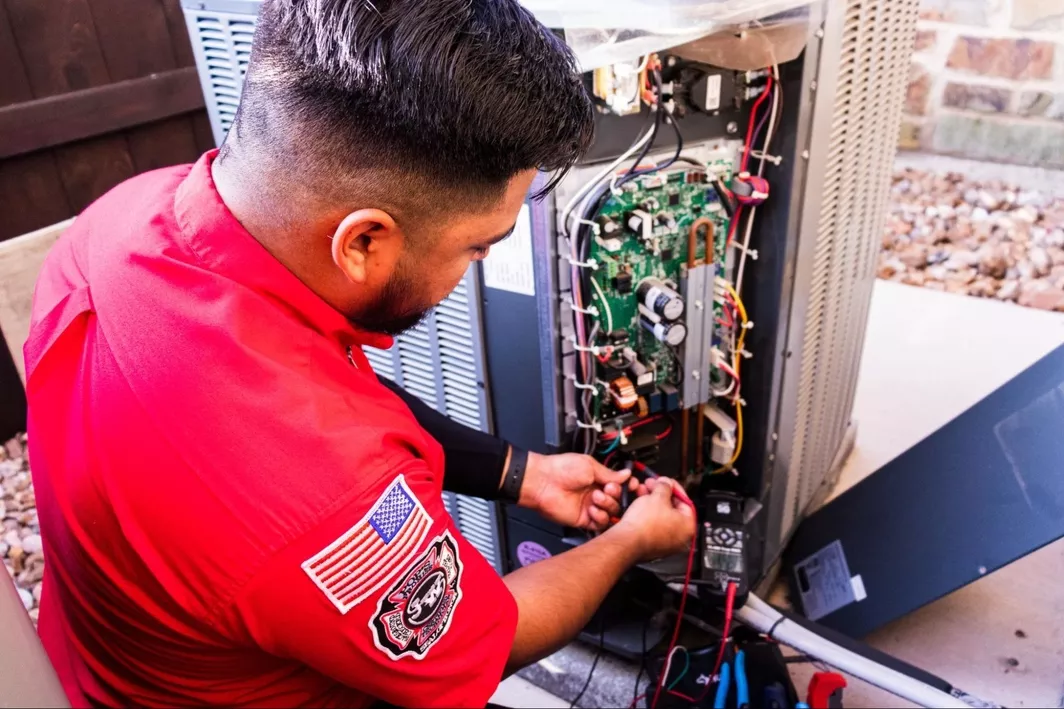Why Is My AC Leaking Refrigerant?

Common causes of an air conditioner leaking refrigerant include corrosion, faulty installation, and damage to coils. If your AC unit is leaking refrigerant, it can significantly impact cooling performance, reducing energy efficiency and potentially damaging your system.
This guide discusses why your AC might be leaking refrigerant and answers questions and concerns such as:
- What causes refrigerant leaks in AC systems?
- Signs your AC is leaking refrigerant
- The impact of refrigerant leaks on your system
- How are refrigerant leaks fixed?
Preventing future refrigerant leaks
Continue reading below to learn more about this common AC unit maintenance concern.
Stop Refrigerant Leaks in Their Tracks — Contact Jon Wayne
Call the NATE-certified technicians at Jon Wayne today for your AC repair service needs. Our fast response times and honest service ensure your refrigerant leak is handled quickly and correctly.
What Causes Refrigerant Leaks in AC Systems?
A variety of issues can cause a leaking air conditioner. Reasons your AC system might be losing refrigerant include:
- Formic acid or other chemicals cause corrosion on refrigerant lines, which eventually leads to small tears that can expose refrigerant
- Poor installation of system components that leave gaps or unsealed seams
- Manufacturing defects that contribute to gaps
- Physical wear and tear that occurs with coils or connections over time
- Long-term vibrations from the unit running create small cracks
Signs Your AC Is Leaking Refrigerant
While convenient options like home automation and smart thermostats make it easy to set and forget your AC unit, it’s important to get eyes on internal and external components once in a while to ensure everything is running well. Signs of an AC refrigerant leak include:
- Reduced cooling efficiency. A system that struggles to maintain desired temperatures needs attention, including addressing a leak.
- Higher energy bills. Unexplained increases in your utility bills could mean your HVAC system is working too hard to cool your home due to an issue.
- Hissing or bubbling sounds. Audible signs of pressure escaping lines or components can indicate a leak.
- Ice buildup on coils. Frost forming on evaporator coils during warm days can indicate a refrigerant leak.
The Impact of Refrigerant Leaks on Your System
Refrigerant leaks negatively impact the performance and lifespan of your AC system. When your unit doesn’t have all the components it needs to run well, increased and unnecessary wear and tear occurs. This can decrease the unit’s energy efficiency and drive up operating costs.
In extreme cases, a lack of appropriate refrigerant levels can cause compressor failure, leading to costly repairs or replacement. Not attending to small issues like a leak could cause problems with your unit to cascade, eventually leading to a need to replace your entire system.
How Are Refrigerant Leaks Fixed?
An HVAC service professional can identify a leak and address it. Steps involved in this process include:
- Leak detection. An experienced HVAC technician uses tools like UV dye or electronic detectors to find the source of a leak. Some leaks can be due to tiny cracks or pinhole openings, making them hard to see without these tools.
- Repair or replacement. Once the leak is found, damaged components, such as coils or refrigerant lines, are repaired or replaced. Your HVAC tech can help you understand your options and how these decisions might impact the repair cost. They can also talk to you about potential upgrades that might make life cooler (and less costly) in the future.
- Recharging the system. After the leak is fixed, the system is recharged with the correct amount of refrigerant to restore optimal functionality.
Preventing Future Refrigerant Leaks
As a homeowner, you can do a lot to prevent future leaks or ensure minor leaks are addressed proactively before they become more significant problems. Start by scheduling regular HVAC tune-ups to care for your system and identify potential issues early.
Schedule some time every month to inspect outdoor components and clear any debris or dirt piled up around or on them. Keeping outdoor HVAC elements clean helps reduce stress on the unit and the likelihood of damage.
You can also maximize peace of mind by investing in high-quality systems and professional installation to minimize the risks of defects that might lead to leaks.
Restore Your Comfort — Schedule AC Repair With Jon Wayne Today
Don’t let a refrigerant leak or other small issue leave you sweating. Call the team at Jon Wayne to schedule AC repair services and rely on the fact that we work to get the job done right the first time.
